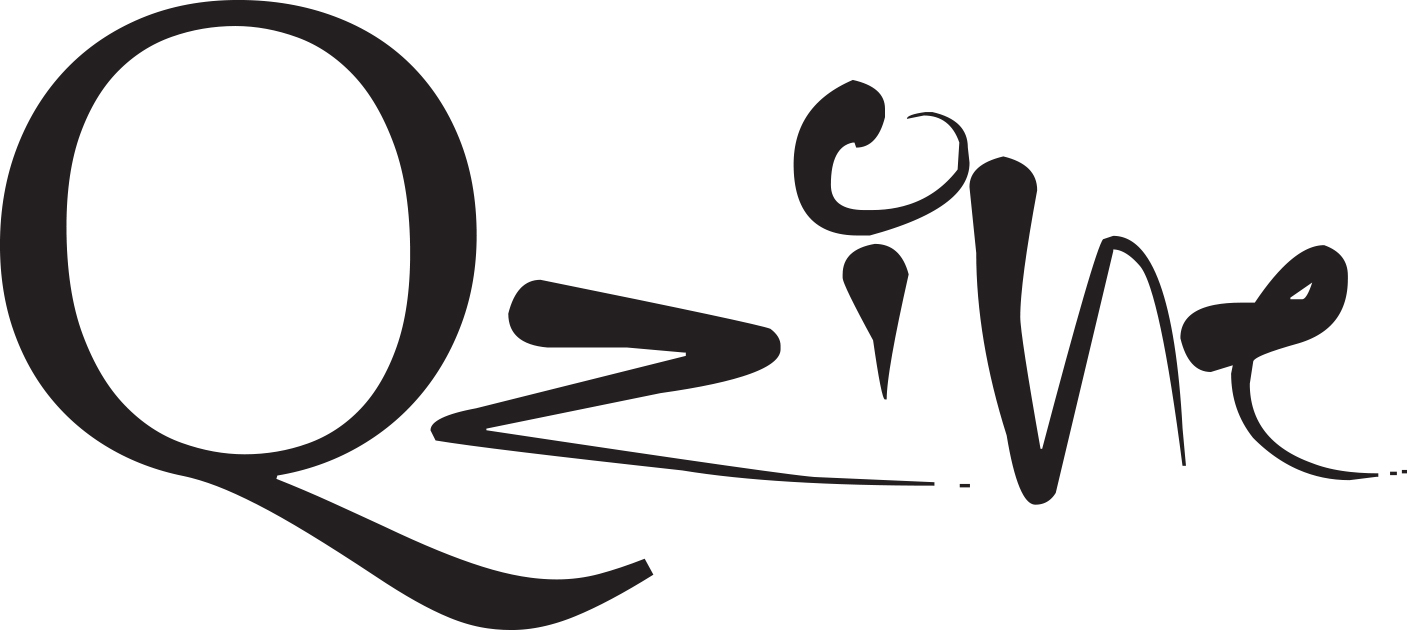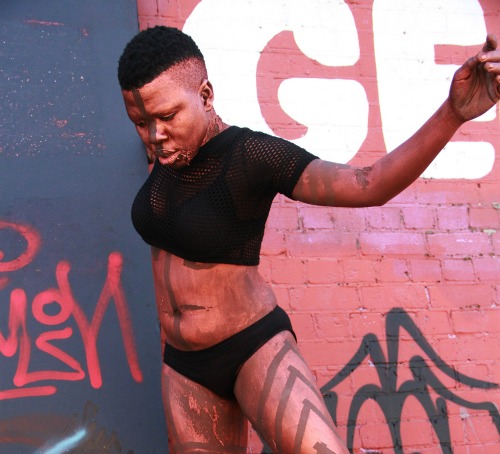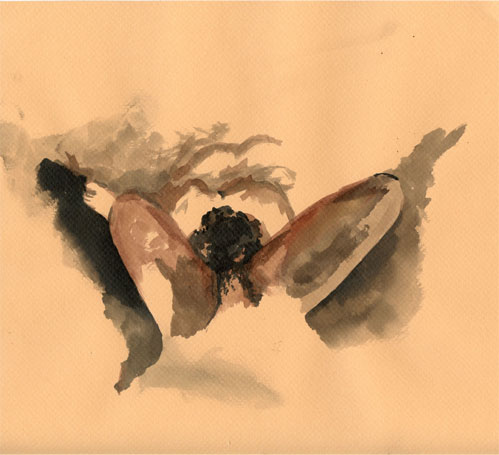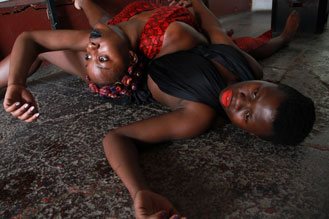The Lithe One
By Ola Osaze. Photo by Siphumeze Khunday
She was tall and lithe. He was languorous, draped in mesh. She was yellow and amorous. Amongst them I was a square shaped 5’4”, the only trans masc surrounded by two Amazonian trans women and one fluid cis gay man. Today an orange-hued despot with a blond combover was inaugurated as US
president. He’d been elected two months ago, after promising to deport three million immigrants,promising police forces around the country the power, like rabid dogs, to unleash themselves and their military-grade weapons onto black people, brown people. And for the benefit of those who view trans and queer people as personifications of sin, who think that we — and women generally — have no rightto self-determine the fate of our bodies, he promised a different kind of wall.
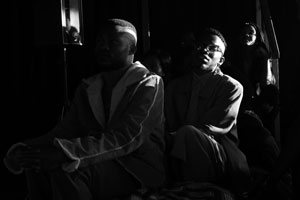
This was our backdrop as the four of us of trooped into Woody’s, a tri-level, multi-room club in downtown Philly, eager for release on the dance floor. Earlier in the evening, I’d been an unwilling participant in this impromptu party, eager to dig into my hotel bed, drown in the down covers, and feast my eyes on what the tube had to say for itself. A simple text, a simple playful goading by him “oh so I’m not motivating enough?” was all it took. I joined them and followed them through the night.
It all began with the word “Africa” imprinted onto a page, the booklet that laid out what workshops were going to be where and when. What cocktail receptions were going to take up the evenings. This was the first time in years I’d returned to Creating Change, a ginormous conference for the gays in America. Here most faces peeking at me in hallways and elevators were oyinbos or mzungus, depending on what part of the continent you’re from and what terms you use to describe white people. Here I least expected to run into other Africans like me who were assigned one or more letters in the alphabet soup of queerness. In “Media, Religion, and Hope in Africa,” the one workshop that spoke to any aspect of my cultural identity, where other queer Africans came, I suspect, because they wanted something familiar and perhaps, like me, they hoped for other familiars as well, in that room of twenty or so people, there were eight of us who had some recent direct link to the continent. We sat spread around the room, not known to each other yet, but when we spoke up or when we caught each other’s eyes as the discussions carried on around us, we knew. The one African on the panel, a cis gay man, a pastor from somewhere in Southern Africa preached on about a global movement to support our people on the continent. He was flanked by a white woman, a chaplain from some church that had chapters all over the world. She too, unlike me stranded on this soil for some twenty-odd years, had the privilege of saying she’d spent considerable time on the continent recently and somehow the conference organizers had taken that as worthiness to present on the subject of “Africa.” Eventually, during the course of the workshop, she was flanked by another white person, a cis gay man from an American foundation who talked about a book written by a group of queer Africans, none of them here to tell us about it themselves. In this murky sea, other white voices felt equipped to chime in about our lives. Through this murky sea, I swam to other Africans, befuddled like me that this nice face of white colonialism was still happening in 2017.
But I’m not here to write about white people encroaching on us. That has been done time and time again. I and the other three reunited later in the afternoon when one of them was giving a talk as part of a panel discussion on LGBT asylees. And again, later in the night, in the reception room where space had been cleared for conference attendees to dance and while away the night. The four of us stood in the corner, swaying to Whitney, Abba, Michael. “Let’s go to Woody’s,” he suggested, and I cringed, the homebody longing for the hotel bed, the drowning covers, the beaming TV screen. But I couldn’t say no. Plus, there was that voice inside me that said this was what I’d been looking for. A gathering of Africans like me, but unlike me, a chance for new friendships fostered in a subtly hostile climate, the beginning of a comradeship that I had an inkling would bloom into something neither of us could have predicted.
Down the street we traipsed, on sidewalks crowded with others, sinewy bodies eager to catch the heat of the dance beat, hulky bodies bouncing off each other, gripped by spasms of laughter. Glaring street lamps caught pupils and irises, cast a yellow glow on dark and pale skins. We wound our way through them. I played my usual game of who’s queer. I tremored in silent fear for the wondrous two of our four, trans women who could care less about the stares. My body braced for the first sling of injurious words or aggressive pushes, but nothing happened. Just us four laughing our way to the club’s entrance, where we joined the fast-moving queue, flashed our IDs, and went in. But I hung back because she, the tall and lithe one, was nowhere to be found. I looked back at the line. She was going through an extra set of scrutiny. I couldn’t hear what she was trying to tell me, what the bouncer had declared to her after seeing and slapping shut her Zimbabwean passport. “You can’t stand here, sir,” said another bouncer to me, because I’d stopped still in the middle of the eager queue, refusing to move without my sister. She came around on the other side of the ropes they’d used to demarcate the line. “He said my visa is expired, so I can’t go in.” “What?” I said, uncertain how to proceed. I beckoned at the others, who by now had come back outside. We all peered at the passport. The visa indeed had expired. “Are you walking around with this?” he asked her, incredulity written into his gaping mouth and raised eyebrows and enlarged eyes. She shrugged. I looked on silently, aware of the fear that was creeping up her body and making her heart race. Once upon a time, I was familiar with that fear. “But your passport is not expired, so he shouldn’t be refusing you entry because of this,” he continued. I was still speechless. She, the amorous one, flicked her long braids to the other side of her face. “He shouldn’t. Can we go talk to him?” “No, I don’t want any trouble. I’m fine with going back to the hotel.” I was faced with a crossroad, so I froze. Back her up and we go back. But we always go back. Back them, the two who were now headed to the troop of bouncers in the black jackets and hat-covered heads, and she the lithe one could be facing something that all of us secretly and openly fear, at least at one time when the word illegal was emblazoned onto the underside of our eyelids. Yet I froze. “I’m fine with going back to the hotel.” she repeated, now to me and me alone, because the other two had taken her passport back to the bouncers, but a different one this time. He was a light-skinned dude, his body filled out with muscle and fat, expanding, it seemed, forever horizontally. He extended vertically too. Tall, stout, and hulking all at once. He peered down at the document, the lights from car lights dancing off the lens of his glasses.
When he beckoned at her, I followed. I prayed. My heart thudded. Should I have snatched her passport back from the other two and insisted we follow her lead? I sensed the fear seeping out of her pores in heavy waves. I saw the way she wavered as she walked towards him. I felt the ground beneath my feet and called up the power that lay in its depths.
“What happened?” The other two started to say something but he cut them off. “I want to hear from her. What happened?” He looked directly at her. I stood to one side. “He looked at my passport and said my visa was expired so I couldn’t go in.” Is this the US border? Is this a customs line at the airport? It is neither. It is a club in the middle of downtown Philly. We four are here to dance. Not cross illegally into some national territory. Not blow something up or shoot something or do anything destructive, just stamp our feet, sway our waists, pump our fists in the air, dip down low to the ground and shimmy back up again. But perhaps there’s destruction in daring to be so free with our bodies, with daring to be in public though our new president says we’re enemy number one, with daring to boldly live life in the open, though our new vice-president
says we should be cured.
“Next time just open your passport to this page.” The light-skinned bouncer points to the bio page where name, date of birth, gender, and nationality are listed, where the age of the passport is listed, and hers was still very young, still very much in its prime. “Don’t open to this page.” He was now referring to the page that had a flimsy piece of paper affixed to it. A paper that said entry to the US had been granted and would expire on such and such date. On hers, the date had come and gone. “Don’t show them this page,” he repeated and handed her back the passport. “Go in,” he said and we all breathed. You know that breathing you do when you don’t know you’ve been holding your breath? When you finally breathe, it’s like the breath of life coursing through your nose into your lungs and back through your nose again. A breath that unfreezes you and unclenches your stomach. Once again, we went through the line. Once again, I was patted down. “It’s my wallet,” I said to another bouncer who
was kneading the bulge in my coat pocket.
Inside the club, drinks in hand, our eyes feasting on the other dancers, our bodies already moving without us having to command them. But she, the lithe one, was stiff, her long narrow fingers grasping the straw in her glass, stirring the ice cubes around and around. A stern look fixed on her face, a faraway look in her eyes. “Are you all right?” I asked foolishly. It was clear she wasn’t. “I would have been fine going back to the hotel,” she said. Then I got it. I saw the detention centers where she’d be lumped with cis men, the way she’d been shoved into a room of them at the men’s shelter when she was homeless. I saw the endless waiting for immigration proceeding after proceeding while waiting, unvisited, in
detention. Denied legal representation. Denied hormones and other necessary gender-affirming medical care. Locked away in 24-hour solitary, supposedly for her protection.
But let’s do away with the niceties and call detention centers what they really are, prisons. I saw the days bleed into weeks into months, where she’d be praying for an end, no matter what it was, so long as it got her the hell out of that jail cell. Then I questioned my part in this ridiculous game of trying to free our people, trying to fight when there was so much that was insurmountable. When a night of clubbing could result in this: a bouncer judging you based on your immigration status. a group of friends deciding to fight for you without your consent. Knowing that they were really fighting for themselves didn’t really make it okay, but when do we stop going back to the hotel room and start pushing? I have the luxury of asking this question.
“It’s okay,” I said. “You’re here now. You’re safe,” I said and almost bit my tongue because safe is bullshit. She said her lawyer was going to file for asylum the following week. I urged her to get that process started right away, just as I’d urged my friend back home in Oakland to get his citizenship process started right away. “What are you waiting for?” I had asked him. As I type this, I’m awaiting my naturalization interview date, which still hasn’t come and I find myself waking at 5 am in a start, wondering what the hold-up is, wondering if something has been found in my history to waylay the process, wondering if now that Trump is officially president all immigration processes have come to ahalt.
An hour later, lithe one was down low, inches from the ground, spreading her legs then bringing them back together, an expression of rapturous wonder on her face as the beat reached the sweet spot – that frenzy of cascading rhythms. I smiled at her though she didn’t see me. I wiped sweat off my forehead and unbuttoned my shirt because this dancing had hold of me too.
